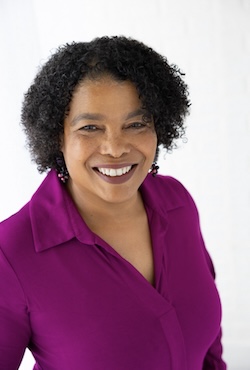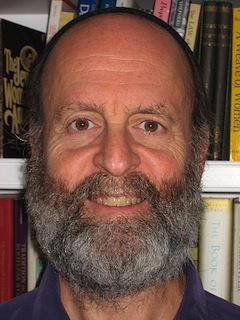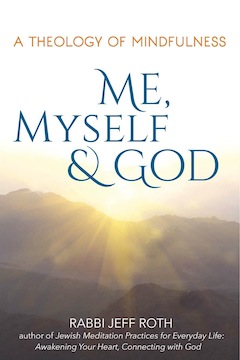Dr. Terri Elizabeth Givens, professor of political science at the University of British Columbia, started her lecture with a quote from Dr. Martin Luther King Jr.: “It takes empathy, patience and compassion to overcome anger, hatred and resentment.”
“And this really rings true during these times,” said Givens, who was giving the keynote address at Vancouver School of Theology’s May 27-29 conference called Compassion: Mutual Care in Troubled Times. “As an American, in particular, I’m very concerned about the situation. I really think it’s hard during times like this to have empathy and patience and compassion.”
Rabbi Laura Duhan-Kaplan, director of inter-religious studies at VST, introduced Givens, who spoke on May 27, giving the |opening lecture of VST’s annual inter-religious studies conference. Givens is the author of several books, including Radical Empathy: Finding a Path to Bridging Racial Divides. Her next book, Reckoning: Creating Positive Change Through Radical Empathy, will be released in October. She has written on immigration policy, European politics, right-wing politics and more.

Givens grew up in Spokane, Wash., did her undergrad at Stanford University and PhD at the University of California, Los Angeles. Her first job was at University of Washington, in Seattle, then she and her husband moved to Austin, where their careers took off. Before UBC, Givens worked at McGill University, first as a lead and advisor on the university’s plan to address anti-Black racism, then as an associate dean.
She started studying the radical right in Europe in the mid-1990s, having first become aware of their existence in 1986, when she visited France as an undergrad. At that time, Jean-Marie Le Pen was on the rise.
“I was one of the first Americans to even pay attention to this topic,” said Givens, who added that all her research is “really about how do we create change – that’s the underlying push for all of this.”
The professor shared some of her personal history, how she was raised, her father’s death in 2001, instances of racism experienced by her parents – her mother, who grew up in rural Louisiana in the 1930s, and her dad, who was born in 1928 near Pittsburgh. Her parents met in Los Angeles but chose to live in Spokane because they thought it would be safer for their kids.
“I think, in telling my story, I’m trying to talk about the different identities we have,” she said. For example, she is a mom, a teacher, an athlete, and more.
For Givens, integrity also has multiple variations. There’s physical integrity, taking care of ourselves. There’s integrity in terms of being honest and straightforward. And there’s integrity in terms of having a solid foundation.
Identity and integrity come into play with radical empathy, which comprises, according to Givens, six steps: a willingness to be vulnerable, becoming grounded in who you are, opening yourself to the experiences of others, practising empathy, taking action, and creating change and building trust.
About the first step, she said, “It’s not about being vulnerable with others, it’s about being vulnerable with yourself…. We have a really hard time [with that] – even just giving ourself a pat on the back is hard…. But the reason that’s so important is … you need to become grounded in who you are, and that’s an ongoing process.”
Taking care of yourself and being grounded in yourself allows you to be open to others, she said.
Radical empathy is circular, said Givens. “It’s a constant movement towards becoming who you want to be. You want to have goals for yourself that reach beyond where you are now, but also you want to have a process to get there.”
We can tap into our integrity, she said, by telling our story, where we fit in family, community, education, health, love and marriage, relationships, and work.
“Empathy is not absolution,” she said. “It doesn’t mean I have to say everything is OK…. Sometimes, people do things that I don’t believe are good for anybody. And so, that’s an important component and, for me, it helps me tap into my integrity because I have to create those boundaries and make sure that I understand where I fit into this broader picture and in the community.”
As she ages, the health aspect is something she is dealing with more. “My dad had a heart attack at 72, my mom had a stroke at 75. Why those things happen, how to understand that, is a big part of our ability to function.”
With respect to love and marriage, she said, “When people ask me what’s important in the relationship, it’s, well, you want to be with somebody who makes you a better person. And that it’s reciprocal.”
This is something that applies to relationships in general, she added.
“Work is a huge part of our lives. I think sometimes we forget how important it is to make sure that our work is something that, regardless of what you do, you take pride in it. It may be something that you don’t want to be doing forever but, where you are right now, it’s important that your work is a part of your story.”
We can’t change the past, but we can change how we go forward, Givens said. “There are these lifelong self-reflection processes that help us learn from the people around us, whether they’re clients or colleagues or friends, and cultural humility is being willing to say I don’t know everything.”
She said, “Too many leaders are full of themselves. It’s good to be modest about your capabilities. And here’s where vulnerability comes in. You have to be willing to admit mistakes. And I really believe that, if you have integrity, that’s not so difficult, to admit mistakes – it’s like, I’m a human being, I’m not perfect, and [having an] awareness of bias…. We know that the system is set up often in a biased way and we talk about meritocracy but what does that mean? It’s not just that you hire people who look like you or are really similar to you – it’s being willing to look beyond that and say, no, this person is the best person for the job even though we don’t have a whole lot in common.”
Givens spoke about having a curiosity about others, having an open mindset, listening without judgment and seeking, with empathy, to understand people. “And then, cultural intelligence is being attentive to other cultures and to adapt as required.”
In the question-and-answer period, Duhan-Kaplan asked about mistakes made by our ancestors, and how we deal with them. She also asked about dealing with the expectations “placed on us in a charged environment – we might open social media for some entertainment and then what we get is, whatever perspective we have, people are ridiculing it and calling us names,” said Duhan-Kaplan. “Cultural humility – once you start to get defensive about yourself and your identity, how do you keep being open to changing?”
“I still struggle with that,” said Givens.
“As a person who’s been racialized, who has ancestors who were enslaved, and yet I have ancestors who were killing Indigenous and pushing Indigenous out of their homelands,” she explained, “one of the things I’m coming to is that we’re a sum of all of this – and all of us are…. And, again, it comes back to acceptance. I have to accept the fact that, if I look in my family history, there are these evil people and there are some really good people.”
History is ugly, she concluded. “I think it’s better to know it and understand it and be willing to say, but I’m here to be better.”
For Givens, the opposite of empathy is apathy because apathy allows us to feel badly about what’s happening but then just throw up our hands and say, “the world is crazy, you can’t do anything.” Her books highlight ways that people can get involved, what they can do, and she incorporates taking action into everything she does, she said.
Ultimately, it’s the actions, the outcomes, and the way we are engaging with the world that is important, said Givens.
Vancouver School of Theology is offering Summer School courses that will be of particular interest to Jewish community members: Rabbi Or Rose teaches Mystics in Modernity, Rabbi David Seidenberg’s class is Kabbalistic Hints in Tanakh, and Rabbi Laura Duhan-Kaplan presents Zechariah: Spiritual Activism for Difficult Times. Classes run July 21-25 at VST or online. Register at vst.edu/vst-summer-school.


 Roth’s latest iteration of that “working out” can be seen in his recent book, Me, Myself and God: A Jewish Theology of Mindfulness (Jewish Lights, 2016), from which he will be presenting practices and Torah teachings at the Dec. 4 session.
Roth’s latest iteration of that “working out” can be seen in his recent book, Me, Myself and God: A Jewish Theology of Mindfulness (Jewish Lights, 2016), from which he will be presenting practices and Torah teachings at the Dec. 4 session.